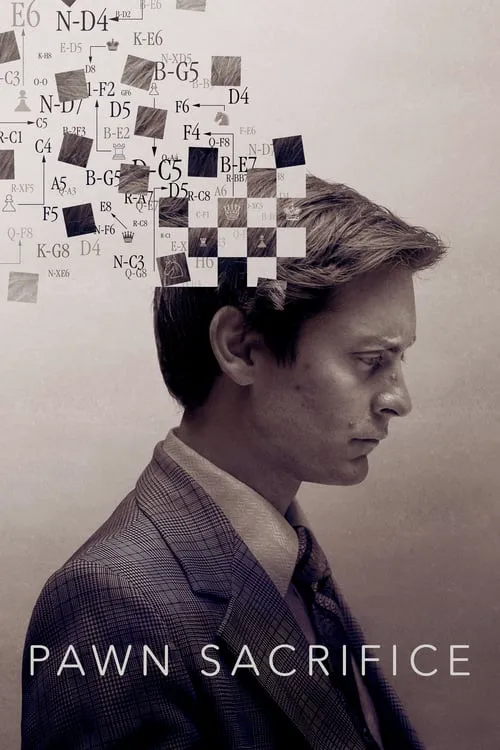Pawn Sacrifice

Plot
Bobby Fischer is a name synonymous with chess, and one of the most iconic matches in the history of the game is his 1972 showdown against Boris Spassky. The film 'Pawn Sacrifice' delves into the lead-up to this pivotal encounter, showcasing the complex and mercurial personality of Fischer as he confronts the pressures of competition. Born in 1943, Bobby Fischer grew up in Brooklyn, New York, in a troubled home marked by a volatile relationship between his parents. His father, Hans, was a German immigrant who struggled financially and emotionally, which created a sense of insecurity for young Bobby. However, Hans also recognized the intellectual gifts of his son and encouraged his interest in chess at a relatively early age. As Fischer's talent began to emerge, his family moved to Brooklyn, where he was able to study and develop his chess skills under the guidance of his mother, Regina. With her help, Fischer learned the fundamentals of the game, quickly mastering the basic principles of strategy and tactics. He made rapid progress, earning international recognition by the time he was just 15 years old, when he became the youngest player to win the United States Chess Championship. In the years leading up to the match against Spassky, Fischer's reputation as a chess prodigy had grown, and he had become the world's top-ranked player. However, his intense focus on the game, coupled with a troubled personal life, was beginning to take its toll on his relationships with his friends and family. He became increasingly distant and withdrawn, unable to form meaningful connections with others. In 'Pawn Sacrifice,' Fischer is portrayed as a deeply intelligent but troubled individual, who is fixated on winning against Spassky. He spends hours in solitude, poring over chess strategies and studying the games of his rivals. His intense dedication to the game borders on obsession, causing strain on his relationships with those around him, particularly with his psychiatrist, Dr. Huston. Fischer's relationship with Dr. Huston is portrayed as a complex and nuanced one in the film. The doctor, played by Toby Leonard Moore, attempts to understand Fischer's motivations and provide a deeper layer of meaning to his chess strategy. However, Fischer's resistance to exploring his emotions and the emotional undercurrents of his personality often leaves Dr. Huston frustrated, as he struggles to connect with his elusive patient. As the match against Spassky approaches, Fischer's mental state deteriorates, and he becomes increasingly isolated from those around him. His relationship with his psychiatrist reaches a breaking point, and Dr. Huston is eventually forced to intervene, seeking to protect Fischer from the consequences of his own fixation. The chess champion's mental instability is further exacerbated by the pressures of the match itself, as he confronts the intense scrutiny of the global media and the expectations of his fans. In a poignant and revealing scene, Fischer confronts Dr. Huston about the reasons behind his intense fixation on chess. The doctor attempts to connect the chess match to Fischer's deeper emotional needs and insecurities, suggesting that the game serves as a coping mechanism for the traumas of his childhood. However, Fischer is unable to confront these issues head-on, instead pushing away the doctor and the emotions that he cannot face. The match itself is a defining moment in the film, capturing the intensity and drama of the competition. Played by Liev Schreiber as Spassky, the Russian chess champion comes across as a charismatic and confident figure, who embodies the spirit of Soviet athleticism and determination. In contrast, Fischer's performance at the board is more erratic, reflecting the turmoil that is raging within him. As the match reaches its climax, Fischer is forced to confront his mental fragility and the consequences of his actions. His chess game against Spassky becomes a manifestation of the internal battle that is raging within him, as he grapples with his own insecurities and the pressures of the competition. In a stunning display of strategic genius, Fischer emerges victorious, but at a terrible emotional cost. The film concludes with Fischer's post-match interview, in which he delivers a chilling, introspective monologue on the nature of the game and his own emotional state. It is a testament to the actor's portrayal that the audience is left with a deep sense of empathy and understanding for Fischer's complex, troubled personality. In 'Pawn Sacrifice,' the director, Edward Zwick, provides a thought-provoking and nuanced exploration of Bobby Fischer's inner world, capturing the turbulent emotions and psychological complexities that made him one of the greatest chess players of all time. The film serves as a testament to the human costs of obsession and the fragility of the human psyche, leaving the audience to ponder the consequences of Fischer's fixation on a game that consumed him completely.
Reviews
Recommendations




